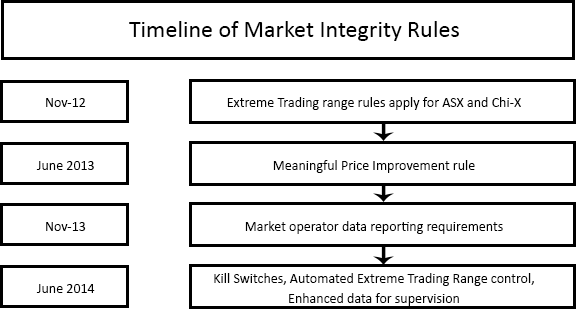The Minister for Financial Services and Superannuation, Bill Shorten, today announced a package of market integrity rules which will better protect investors who use Australia's financial markets. The package includes the use "kill switches" over algorithmic trading.*
"The Gillard Government has delivered reforms that have led to the development of a world leading and modern financial system, whilst ensuring that there is a balance in place that adequately protects investors and the stability of the Australian economy.
"The Government is committed to ensure that investors have choice and benefit from competition. In 2011, the Government approved the commencement of Chi X as a new securities exchange in Australia I am pleased that this had led to significant improvements in product offering and reduced fees.
"I am aware that some investors have expressed concern about the use of High Frequency Trading and dark pools. The Government is acting to ensure that investors have continued confidence in Australia's financial markets. I believe that these new rules will help to reduce the risk of market volatility from high frequency trading and provide increased investor protection for retail investors and others trading in dark pools," Mr Shorten said.
The rules have been developed following extensive consultation by the Australian Securities and Investments Commission.
The new rules provide for:
- direct control over trading algorithms, including 'kill switches' to immediately stop an algorithm if required;
- new extreme trading rules in cases of large price movements;
- a requirement that dark pools offer meaningful price improvement over the lit market, with exemptions for block trades; and
- additional data reporting requirements to assist ASIC in performing market surveillance.
The market integrity rules will provide for an immediate obligation on the market operators, ASX and Chi X, to enforce an extreme trading range for trades in securities. There will also be new data reporting requirements on operators from 2013.
For market participants, the obligations from the market integrity rules will come into force over a 6 to 18 month period. Whilst these market integrity rules are a good start, stakeholders have advised that there are additional issues that need to be considered.
As a result, ASIC has also launched two task forces focussing on dark liquidity and high frequency trading which are due to report to the Government in March 2013. Further detail on the work on the taskforces is below.
The Minister also announced that he has requested the Australian Treasury to conduct a review of Australia's financial market licensing regime.
Whilst the review will examine the licensing of dark pools, it will also be directed at ensuring that the market licensing regime is generally fit for purpose. Stakeholders will have an opportunity to provide their views as part of this review. Further information in relation to this review will be announced shortly.
"I want to ensure that the licensing framework arrangements under the Corporations Act are appropriate so that ASIC has the best possible tools to supervise and regulate both the more traditional public exchanges and more recent developments. The Government also seeks a system that is adaptable as new markets and ways of trading develop. I welcome comments from all stakeholders." Mr Shorten said.
The new rules can be found on the ASIC website.
20 November 2012
*Algorithmic trading is the trading that results from a computerised, rule-based system responsible for generating orders to buy or sell a security
ASIC Dark liquidity and high frequency trading taskforces
In July, ASIC established two internal taskforces to undertake thematic reviews of issues related to dark liquidity and high frequency trading (HFT). The core aim of these taskforces is to deepen ASIC's understanding of the impact of these developments on market integrity and quality, and where appropriate, make recommendations to address any problems identified.
ASIC have begun an information gathering process through engaging with stakeholders through bilateral meetings, presentations and questionnaires. There have also been discussions with overseas regulators, market operators and investors to understand global developments.
The next step is for ASIC to analyse the problems that have been identified and to formulate options and recommendations. While ASIC is still in the fact finding first step, an indication of the types of options being considered, or likely to be considered, include:
Dark Liquidity
- for dark liquidity, whether the minimum order threshold for dark trading should be increased from $0;
- enhanced conflict management controls;
- rules for trade monitoring; and enhanced disclosure to clients;
High Frequency Trading
- order to trade ratios;
- minimum order size; and
- a review of tick sizes.
ASIC will report their findings in March 2013. If ASIC proposes rules changes, it will release a consultation paper which will provide stakeholders with an opportunity to provide their views.

